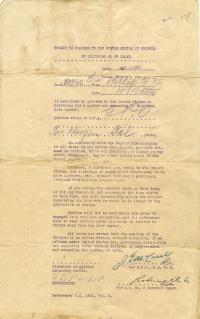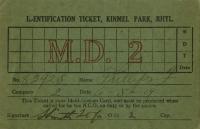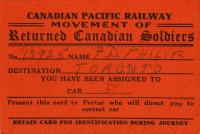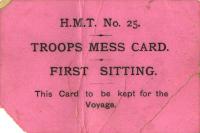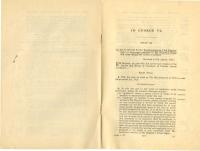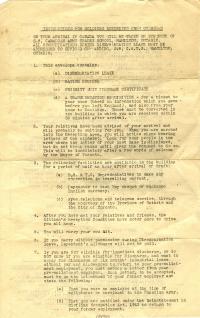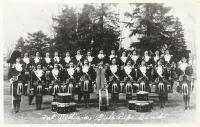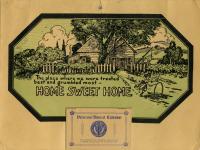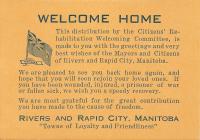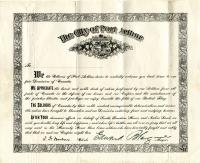Demobilization
Uniform Permit
Fraser Philip of the 15th Battery, Canadian Field Artillery (CFA), received this permit in order to wear his uniform in San Diego, California, on discharge in May 1919. The permit laid out rules that soldiers in uniform in public were required to follow, such as not drinking liquor in communal places.
Kinmel Park identification ticket
Kinmel Park in Wales was the site of a serious riot in March 1919 among Canadian soldiers awaiting demobilization. Identification cards were issued (this one to F.D. Philip of the 15th Battery, Canadian Field Artillery) in the aftermath of the riot to allow the authorities to exercise better control over the camp.
CPR Movement of Returned Soldiers
The Canadian Pacific Railway was one of the transportation companies used to send soldiers home after demobilization. Cards like this, belonging to Fraser Philip of the 15th Battery, Canadian Field Artillery (CFA), were given to soldiers for identification purposes.
Troops Mess Card
Upon demobilization, troops were given vouchers for meals aboard ships on their return home. This troops mess card was given to William Winter of the 79th Battery, Canadian Field Artillery (CFA). Winter was returned to Canada in March 1919 on HMT Royal George; his temporary home on the vessel was deck E, section 3, bunk #325.
The Reinstatement in Civil Employment Act
This Act from 1946 was passed by the Parliament of Canada with the purpose of providing the reinstatement in civil employment of discharged members of the Canadian forces and other individuals who mobilized during the Second World War. The Act intended to regulate the reintegration process of ex-members into civil society, in an attempt to make easier the transition of labour for a war economy into a post-conflict, peacetime economy. Social benefits and considerations like those needed for disabled veterans were also considered in the Act.
A smooth transition
These instructions, for military personnel from the Hamilton and Niagara regions, dealt with practical matters such as pay, clothing, and transportation, but also warned returning soldiers, "Don't take V.D. home."
Coming home to the lakehead
This image of the women's pipe band was given to veterans in Fort William, Ontario, as they returned from service during the Second World War.
Home Sweet Home
An idyllic image of home, the kind that sustained Canadians in uniform through the long years of war.
Welcome home to Manitoba
Tokens like this card were common after the First World War, but less so after the Second. It is also unusual in mentioning returning prisoners of war and those who had fallen sick.
Welcome back to the lakehead
The city of Port Arthur, Ontario, distributed scrolls to returning soldiers in 1919, to thank them for their efforts in defence of "Truth, Freedom, Home, and Native Land."

